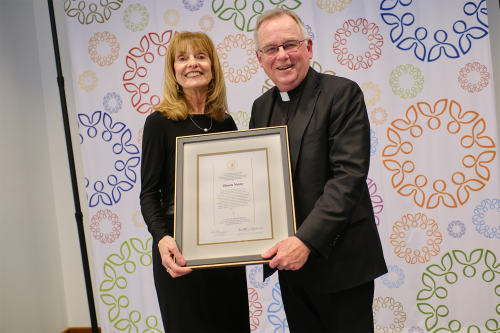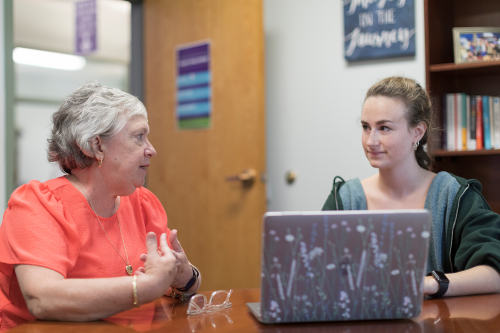A Man for Others
Justice Serge Georges delivers impactful speech during campus visit.
Stonehill College welcomed Serge Georges, an associate justice of the Massachusetts Supreme Judicial Court, to campus on February 1 as part of a program co-hosted by the Office of Intercultural Affairs and the Martin Institute for Law & Society.
During an impassioned address delivered to students, faculty, staff and friends of the College, the Randolph resident not only traced his path to the highest court in the Commonwealth, but also shared words of wisdom applicable to people from all walks of life.
“Justice Serge Georges is an inspirational man and leader in our courts and state. With a humble and kind demeanor, he used humor to connect with our audience. He inspired us all to work hard and help others. If more people like Justice Georges make it to the bench, the future of our justice system will be bright,” said Professor Kathleen Currul-Dykeman, chair of the Department of Criminology and director of the Martin Institute.
Here are some of the important lessons learned during Georges’ visit.
Working Hard and Being Good to People
Georges shared stories from his youth throughout his speech. He noted that his parents, who immigrated to the United States from Haiti in the 1970s, were “big parochial school people.” As such, Georges attended Boston College High School when he was a teenager. He later completed undergraduate studies at Boston College, where he also played football. His experiences at these Jesuit institutions impressed upon him the importance of showing people kindness.
“The Jesuit tradition is steeped in the model that we are called upon to be men and women for others,” Georges said. “There’s always been this aspect of my life that’s been informed by my faith, that you just need to be good to people and help people if you can…In terms of how I got here, I guess you could distill it down to working hard and being good to people.”
Assistant Director for Mentorship & Advising Teddi Nguyen Lydon (left), Assistant Director of Intercultural Affairs Selena Hernandez (center) and Professor of Criminology Kathleen Currul-Dykeman (right) pose with Justice Serge Georges.
Taylor Sprague '23 (left), Evan Turgeon '24 (center) and Grace Shaughnessy '23 (right), seen here with Currul-Dykeman, helped facilitate Justice Georges' visit.
Finding the Ties That Bind
Georges believes that part of being good to people involves taking time to get to know others, especially those who seem different from us.
“You may wonder whether you can find any common ground,” he said. “They may not look like you. They may not eat the same food that you eat. They may not come from the same background as you. So what? Say hello. Have a conversation. I can almost guarantee you, dollars to doughnuts, that if you talk long enough, you’ll find you have some tie that binds, some shared experience, and you’ll both be richer for that.”
Conquering Imposter Syndrome
Though he currently sits at the top of his profession, Georges is like many people in that he sometimes grapples with imposter syndrome, a psychological occurrence in which a person doubts their skills.
“[Am I] hoping nobody figures out that I’m terrified I’ll fail, that I’m terrified I won’t do a good job? I am,” he said.
When faced with these negative thoughts, Georges tries to remind himself that the only things he can control in life are his integrity and work ethic. He then proceeds with his work accordingly.
Giving Others A Chance
At times when he feels uncertain about his own abilities, Georges also takes time to reflect on all the people who knew he could achieve great things, even when he did not. Recognizing the impact that their influence had on him, he notes the value of paying that goodwill forward.
“If we know one thing that is unequivocally true in this world…it’s that if you give human beings a chance, they can be awesome and they will be awesome,” he said. “If you really find yourself wondering if there’s anything you can do, think about any amount of kindness that’s ever been given to you or shown to you and just put that back out in the world. It’s going to be the gift that keeps on giving.”


